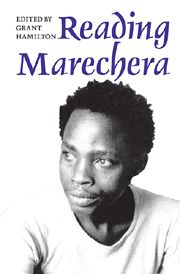Book contents
- Frontmatter
- Contents
- Notes on Contributors
- Introduction
- 1 A Brotherhood of Misfits
- 2 Blowing People's Minds
- 3 Grotesque Intimacies
- 4 Tracing the Stain in Marechera's ‘House of Hunger’
- 5 Menippean Marechera
- 6 Black, But Not Fanon
- 7 The Avant-Garde Power of Black Sunlight
- 8 Classical Allusion in Marechera's Prose Works
- 9 Revisiting ‘The Servants' Ball’
- 10 Marechera, the Tree-Poem-Artifact
- Bibliography
- Index
10 - Marechera, the Tree-Poem-Artifact
Published online by Cambridge University Press: 05 April 2013
- Frontmatter
- Contents
- Notes on Contributors
- Introduction
- 1 A Brotherhood of Misfits
- 2 Blowing People's Minds
- 3 Grotesque Intimacies
- 4 Tracing the Stain in Marechera's ‘House of Hunger’
- 5 Menippean Marechera
- 6 Black, But Not Fanon
- 7 The Avant-Garde Power of Black Sunlight
- 8 Classical Allusion in Marechera's Prose Works
- 9 Revisiting ‘The Servants' Ball’
- 10 Marechera, the Tree-Poem-Artifact
- Bibliography
- Index
Summary
I am reading Dambudzo Marechera with suspicion, not of him, but of the agenda, conditions and occasions that introduced his writing to me (and to the literary world). I am suspicious of a literary establishment that seeks to contain him within academic criticism. The scholar's proud ownership of the writer may be compared to the colonialist's claim to the land, ignoring the native ‘barbarians’ and ‘savages’ who were already there before him and who require civilization and translation. This is Marechera colonized, canonized and collected in print. At the same time, I recognize the limits and irony of my suspicion, acknowledging the very condition of my writing about him. To borrow the words of Max Horkheimer and Theodor W. Adorno from a related context, the triumph of the academic industry is that we feel compelled to use the language of literary criticism even though we see through them. Marechera puts to shame the careerist institutional writer. Marechera in postcolonial literature. Marechera the Zimbabwean poet. Marechera the African author. Emerging Perspectives on Dambudzo Marechera. This book. This essay. Is there another way of reading him? Is there a way in which we are able to exit the postcolonialist and/ or academic frame? How may we engage ‘the black madman’ in an open dance?
- Type
- Chapter
- Information
- Reading Marechera , pp. 172 - 186Publisher: Boydell & BrewerPrint publication year: 2013



